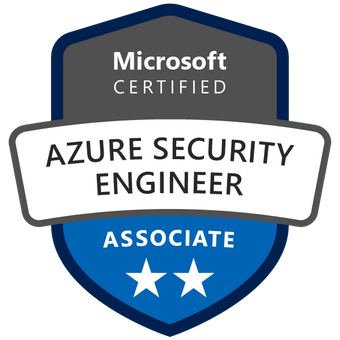Microsoft Certified: Azure Security Engineer Associate
No Exam Required: Pass 100% Guaranteed
Microsoft Certified: Azure Security Engineer Associate: Your Path to Cloud Security Excellence
The Microsoft Certified: Azure Security Engineer Associate certification is designed for IT professionals who specialize in implementing security controls, maintaining security posture, managing identity and access, and protecting data, applications, and networks in Microsoft Azure. This certification validates your ability to secure cloud environments using Azure Security Center, Azure Key Vault, Azure Active Directory (AAD), and other Azure security tools.
At AllCerts , we provide a seamless path to achieving your Microsoft Certified: Azure Security Engineer Associate certification. Our streamlined process, expert resources, and support ensure you’re fully prepared to excel in the certification exam and apply your knowledge in real-world cloud security scenarios.

What is the Microsoft Certified: Azure Security Engineer Associate Certification?
The Microsoft Certified: Azure Security Engineer Associate certification is an intermediate-level credential designed for individuals who specialize in securing Microsoft Azure environments. It validates your ability to:
- Implement and manage security controls across Azure resources.
- Maintain security posture using Azure Security Center and Azure Defender.
- Manage identity and access using Azure Active Directory (AAD) and Conditional Access policies.
- Protect data, applications, and networks using encryption, firewalls, and threat protection tools.
- Monitor and respond to security threats using Azure Monitor and Log Analytics.
This certification is ideal for Azure Security Engineers, Cloud Security Specialists, and IT professionals responsible for securing cloud environments.
Why is the Microsoft Certified: Azure Security Engineer Associate Certification Important?
As businesses increasingly adopt cloud technologies, the demand for skilled Azure Security Engineers continues to grow. Employers look for individuals who can design, implement, and maintain scalable, secure, and efficient cloud security solutions, and Azure Security Engineer Associate certifies your readiness to do just that.
Key Benefits of the Microsoft Certified: Azure Security Engineer Associate Certification
- Career Advancement : This certification opens doors to roles such as Azure Security Engineer, Cloud Security Specialist, or IT Manager.
- Industry Recognition : As a globally respected certification, Azure Security Engineer Associate is trusted by employers worldwide.
- Foundation for Advanced Certifications : Prepares you for higher-level certifications like Microsoft Certified: Cybersecurity Architect Expert .
- Vendor-Specific : Focuses specifically on Microsoft Azure, one of the leading cloud platforms globally, making you highly employable in cloud security roles.
How to Get Your Microsoft Certified: Azure Security Engineer Associate Certification Online
At AllCerts , we make obtaining your Microsoft Certified: Azure Security Engineer Associate certification a straightforward process. Here’s how it works:
Step 1: Get in Touch
Reach out to our team to start your journey. We’ll provide all the information you need about the certification, exam process, and study resources.
Step 2: Access Study Materials
We offer targeted study resources designed to cover all AZ-500 exam objectives. These materials are concise, easy to understand, and include practice questions to reinforce your knowledge.
Step 3: Prepare for the Exam
Our online training tools and practice exams simulate the actual test environment, helping you build confidence and ensure you’re fully prepared.
Step 4: Schedule Your Exam
Once you’re ready, schedule your exam through Pearson VUE, which offers both in-person and online proctoring options for your convenience.
Step 5: Pass the Exam
With our 100% pass guarantee, you’ll be equipped to pass the exam on your first attempt. If not, we’ll provide additional support or refund your payment.
Step 6: Receive Your Certification
After passing the required exam, you’ll officially earn the Microsoft Certified: Azure Security Engineer Associate certification, showcasing your advanced cloud security expertise to potential employers.
Microsoft Certified: Azure Security Engineer Associate Exam Overview
The Microsoft Certified: Azure Security Engineer Associate certification requires passing one exam .
Prerequisites :
- Candidates are encouraged to have foundational knowledge of Microsoft Azure services and experience with security tools like Azure Security Center, Azure Key Vault, and Azure Active Directory (AAD). Completing the Microsoft Certified: Azure Fundamentals (AZ-900) certification is recommended but not mandatory.
Exam Details :
- Exam Code : AZ-500 (Microsoft Azure Security Technologies)
- Focus Areas :
- Managing identity and access (AAD, Conditional Access, RBAC).
- Securing cloud resources (firewalls, network security groups, encryption).
- Implementing platform protection (Azure Security Center, Azure Defender).
- Managing security operations (threat detection, incident response).
- Ensuring data and application security (encryption, key management).
- Duration : 120 minutes.
- Number of Questions : Approximately 40-60.
- Passing Score : Approximately 700 (on a scale of 100-1000).
- Cost : Approximately $165.
Exam Domains and Objectives
1. Manage Identity and Access :
- Configuring Azure Active Directory (AAD) users, groups, and roles.
- Implementing role-based access control (RBAC) and Conditional Access policies.
- Securing identities with Multi-Factor Authentication (MFA) and Privileged Identity Management (PIM).
2. Secure Cloud Resources :
- Configuring network security groups (NSGs) and firewalls.
- Implementing Azure DDoS Protection and Web Application Firewall (WAF).
- Securing storage accounts and virtual machines with encryption.
3. Implement Platform Protection :
- Using Azure Security Center to monitor and protect resources.
- Enabling Azure Defender for advanced threat protection.
- Configuring security
2205 Broadway, New York, NY 10024, USA
Call: +1 (310) 439-8591
Email: info@allcerts.org
Generalised Exams
SIGN UP
Keep me up to date with content, updates, and offers from Phlox

